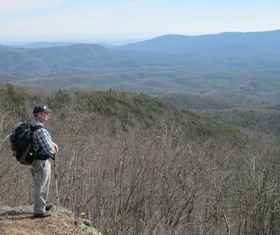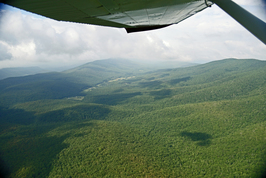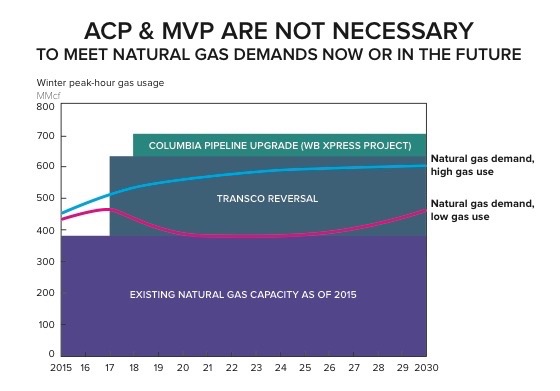 Photo: Looking from Ramseys Draft Wilderness toward Hankey Mountain, where two native brook trout streams would be crossed by ACP access roads. Photo by Lynn Cameron
Photo: Looking from Ramseys Draft Wilderness toward Hankey Mountain, where two native brook trout streams would be crossed by ACP access roads. Photo by Lynn Cameron Forest Service Concerned about ACP Access Roads
The Forest Service (FS) expressed concerns about Dominion's Atlantic Coast Pipeline (ACP) route and accompanying access roads in a Sept. 1, 2016 letter to FERC. The letter cited Dominion's intent to build a new access road that would cross Laurel Run, a native brook trout stream in Bath County, multiple times. The FS states strongly that "the proposed access road is inconsistent with Forest Plan standards and best management practices (BMPs)" and is unacceptable. The letter also expressed concerns about access roads crossing streams that flow off Hankey Mountain in the Dowell's Draft and White Oak Draft areas, both wild brook trout streams.
ACP access roads are as problematic as the pipeline itself. They fragment the forest, degrade endangered Indiana bat habitat, threaten native brook trout streams, disturb Special Biological Areas, and intrude on popular recreation areas in our national forests.
The FS will be conducting a more thorough review of the pipeline and associated infrastructure.
Learn more from DPMC Story Maps:
The Forest Service (FS) expressed concerns about Dominion's Atlantic Coast Pipeline (ACP) route and accompanying access roads in a Sept. 1, 2016 letter to FERC. The letter cited Dominion's intent to build a new access road that would cross Laurel Run, a native brook trout stream in Bath County, multiple times. The FS states strongly that "the proposed access road is inconsistent with Forest Plan standards and best management practices (BMPs)" and is unacceptable. The letter also expressed concerns about access roads crossing streams that flow off Hankey Mountain in the Dowell's Draft and White Oak Draft areas, both wild brook trout streams.
ACP access roads are as problematic as the pipeline itself. They fragment the forest, degrade endangered Indiana bat habitat, threaten native brook trout streams, disturb Special Biological Areas, and intrude on popular recreation areas in our national forests.
The FS will be conducting a more thorough review of the pipeline and associated infrastructure.
Learn more from DPMC Story Maps:
 Laurel Run in the GWNF in Bath County. Photo by Rick Webb, Pipeline Air Force
Laurel Run in the GWNF in Bath County. Photo by Rick Webb, Pipeline Air Force Your Help is Needed!
Tell the Forest Service to deny Dominion's request for a special use permit to build the ACP and 20 miles of destructive access roads through the GW and Monongahela national forests. Construction and maintenance of this new utility corridor through our public lands would fragment core forests, put important watersheds at risk, and violate both forest plans.
Send your comments to: [email protected] Be sure to thank the USFS for being responsible stewards of our national forests.
Tell the Forest Service to deny Dominion's request for a special use permit to build the ACP and 20 miles of destructive access roads through the GW and Monongahela national forests. Construction and maintenance of this new utility corridor through our public lands would fragment core forests, put important watersheds at risk, and violate both forest plans.
Send your comments to: [email protected] Be sure to thank the USFS for being responsible stewards of our national forests.
ACP and MVP Are Not Needed
Neither the Atlantic Coast Pipeline nor the Mountain Valley Pipeline are needed to meet our region’s future energy demands, according to a report by independent energy experts that was released on Sept. 12, 2016.
The conclusion of the study was, "Additional interstate natural gas pipelines, like the Atlantic Coast and Mountain Valley projects, are not needed to keep the lights on, homes and businesses heated, and existing and new industrial facilities in production.” Our existing system of buried natural gas pipelines is sufficient to meet the region’s peak demands through 2030. Both of these proposed pipelines pass through special places on our public lands, fragmenting forests, threatening water supplies, and degrading popular recreation resources.
The report was written by Synapse Energy Economics and released by Southern Environmental Law Center, Appalachian Mountain Advocates, and the Allegheny-Blue Ridge Alliance.
Neither the Atlantic Coast Pipeline nor the Mountain Valley Pipeline are needed to meet our region’s future energy demands, according to a report by independent energy experts that was released on Sept. 12, 2016.
The conclusion of the study was, "Additional interstate natural gas pipelines, like the Atlantic Coast and Mountain Valley projects, are not needed to keep the lights on, homes and businesses heated, and existing and new industrial facilities in production.” Our existing system of buried natural gas pipelines is sufficient to meet the region’s peak demands through 2030. Both of these proposed pipelines pass through special places on our public lands, fragmenting forests, threatening water supplies, and degrading popular recreation resources.
The report was written by Synapse Energy Economics and released by Southern Environmental Law Center, Appalachian Mountain Advocates, and the Allegheny-Blue Ridge Alliance.
Learn more from:
- DPMC Story Map: Atlantic Coast Pipeline: A Question of Need
- SELC Press release: New report shows demand doesn’t justify new natural gas pipelines
- Full economic report by Synapse: Are the Atlantic Coast Pipeline and the Mountain Valley Pipeline Necessary? An examination of the need for additional pipeline capacity into Virginia and Carolinas


 RSS Feed
RSS Feed